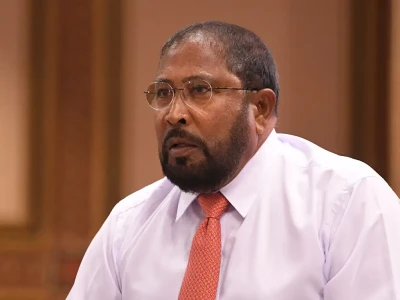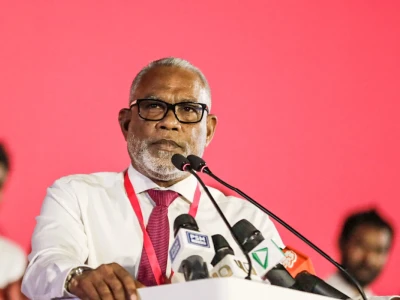
Unmasking Maldives' strange love affair with CMC!
Despite all these projects, the company has not made any financial progress since its inception.
By
Ahmed Naif
President Dr. Mohamed Muizzu's landmark project, the development of a whole new city called RasMale, reclaiming Fushidhiggaru lagoon, began on December 18 last year. The President inaugurated the city project that day, commissioning a company called Capital Marine and Investment Company (CMC).
The company, which took over major projects such as the Gulhi lagoon and Fushidhiggaru dredging projects during the MDP government, commenced work, but it soon came to a halt. The government has now decided to terminate the agreement with the company after the project, for which they were promised 70 hectares of land, including from Hulhumale, the most expensive land in Maldives, has not continued.
With that, questions about the CMC have grown. Where do they come from, who are they?
The truth about CMC
CMC is owned by Sivarajah Manivannan, a British citizen of Sri Lankan descent, better known as Raju, whose shareholders are Capital Investment Finance Limited (CIF), which was registered in the UK on 6 July 2001 with Raju holding more than 75% of the shares. CMC's parent company is Raju-controlled CIF. Therefore, the CMC that successive Maldivian governments had dealings with is actually a subsidiary of Raju's CIF. To put it simply, CMC is a company created by Raju's CIF to make it easier to do business in Maldives.
The origins of the CIF company as the country’s land reclamation monopoly are revealed, and the reasons why this company has become a monopoly become clear from an examination of the company’s financial accounts published by the UK Companies Department. CIF, which deals in construction and real estate, is among the smallest and medium-sized companies due to its low revenue.
A look at the company's financial statements shows a lot of interesting and suspicious dealings. It reveals what the company is actually doing and why it has become such a friend of every government in Maldives. The figures also explain why the company could not complete the dredging of RasMale.
Operating at a loss for many years
According to the financials, CIF did not generate any revenue for the first three years. It is safe to assume that the company was left dormant for three years. The company first started generating revenue in 2004, from consultancy services. After that, there was no income for many years again.
According to the figures available, the company's total revenue in recent years was just GBP 1.2 million (about MVR 24 million). That’s roughly an average of a million a year. Records show that the company appears to be financially poor despite having carried out some of the biggest land reclamation projects in the country, including the construction of ports and harbours.
According to the statistics, it does not look like the company deserves such projects from the Maldives. The company doesn't have that kind of turnover. And at such loss
The company has suffered a loss of millions of pounds (MVR 23.7 million) in recent years. There are serious questions about why Maldives has awarded billions of Rufiyaa worth of projects to a company that is repeatedly losing money.
"According to the statistics, it does not look like the company deserves such projects from the Maldives. The company doesn't have that kind of turnover. And at such loss," an experienced chartered accountant in Maldives who helped Atoll Times study the company's accounts said on condition of anonymity.
"If they did due diligence, they would know that the company is not at the level of running any megaprojects. The question is did they do that?"
In the past four governments, major projects have been awarded to the company while the CMC remained financially at zero. Most of the projects were awarded to the company during the government of President Abdullah Yameen and the last days of the government of President Ibrahim Mohammed Solih. According to available information, the company was awarded a total of eight projects in both these governments. Many projects were awarded to the company while the current President Muizzu was the Housing Minister of the Yameen government.
Despite all these projects, the company has not made any financial progress since its inception. The financials show no reason or indication that the company is capable of handling all these projects.
For example, the company has GBP 156,950 (MVR 2.4 million) in cash, including its bank account, according to its latest 2022 financial statements. However, the government has said that the company will spend USD 500-700 million (MVR 10 billion) to dredge RasMale. It is unbelievable that a company worth only 2 million could run a project worth MVR 10 billion.
The company was awarded the land dredging project last year. According to its 2022 financial statements, the company has only four employees, including its directors. It is again unbelievable that a company with such large projects has so few employees.
"A company that runs such a project will not have this amount of money. And there will be many employees," the expert said.
When the RasMale project was awarded to the company, the company's total share price or capital was GBP 100,000. The share price of a company running a project the scale of Rasmale should be higher.
Bankruptcy with huge debts
Since CFI is a small company, it does not have to file income statements and profit-and-loss statements containing details of income and expenses in the financial statements it must submit to British authorities in the recent past. Therefore, it is impossible to confirm that the company's subsequent revenues and expenses are the most accurate.
According to the latest CFI financial statements for 2021 and 2022, the company's liabilities exceed its assets by GBP 2.1 million. This means that the company cannot pay off its debts by selling its existing assets. The company is not generating enough revenue to pay off the debts.
The expert who helped study the financial statements said that it also shows that the company does not have the financial capacity to run a project of any magnitude. The company does not have enough assets to run any mega project either, he said.
"If this was done responsibly, neither the company nor any of its subsidiaries would be awarded the project. Financially, there is no capacity to execute a project," he said, noting that could be the reason why the RasMale project was not executed.
"The question is why governments are handing over such projects to such a company”.
Smells like fraud
According to CIF's 2022 financial statements, the company is owed GBP 23.6 million from its affiliates and owes GBP 25.8 million to the same parties. According to the figures, the GBP 25.8 million is owed to a company called Universal Shipping. However, the company was dissolved this year, according to records. In addition, the company has not recorded any receivables from CIF in its 2022 financial statements.
The expert who helped analyse the financial statements said there were suspicious factors about the transactions. He said there was little chance that the transactions recorded by the company were genuine business transactions.
"It is very likely that these are fraudulent accounts. The accounts do not reflect that the company has done enough work to make such transactions," he said.
In addition, a total of GBP 3.6 million was included in the 2009 financial statements as intangible assets or goodwill, which was financed by other reserves.
The expert said that having done so, it was shown in the accounts as a genuine business activity, but there was little room to check whether this was a valid or genuine transaction.
A company bound by legal issues
According to the audited financial data, in 2011, it was found that the money invested in the company that built the Gulhi project was raised either by paying within a year or borrowing GBP 5.6 million in short-term finance from someone.
This shows that the company did not have sufficient financial capacity when the project was awarded during the first MDP government. It also shows that since then, every government has given projects to the company despite not having the capacity. Therefore, the result is that the company is unable to execute the project either. And other projects are not moving at a reasonable pace as agreed.
The audited financial statements show that various parties have filed lawsuits against the company to seek money from the company. The company's 2021 financial statements show a loss of GBP 1.8 million due to the halt of the Gulhi lagoon project.
Note #26 of the company's audited 2014 financial statements shows that GBP 2 million (USD 3.1 million) is likely to be paid to various parties in connection with the Gulhi lagoon project. The same report also notes that a supplier has sent a notice to the company to pay GBP 2.3 million (MVR 56.1 million) in connection with the Gulhi lagoon project.
A company that revolves around Maldivian taxpayers money
One thing that is clear from the company's accounts is that if any money has entered CMC, it has come from a project in Maldives. CIF does not have projects in other countries. There is no mention of any other project in the company's audited financial statements.
The audit found that in 2015, a large amount of money was taken in advance from customers to build apartments in Gulhi. Auditors have noted that the company does not have the financial capacity to build the flats at an estimated cost of USD 6.6 million (MVR 152 million).
The company receives any money during the implementation of projects in Maldives. A large amount of money came in during the implementation of the Gulhi lagoon project. Then it slowly ran out. The company's highest revenue was in 2013. It received MVR 103 million in the same year.
That is guaranteed by the fact that there is no significant growth in the company's capital or share capital. The company was founded in 2001 for two pounds. In 2008, the share capital increased to GBP 25,000. The stake has since been increased to GBP 100,000 with the Gulhi lagoon project. Most likely due to inflation of the share capital.
Furthermore, if the intangible asset of 3.6 million, which was not known in 2009, was deducted from the company's total net asset, the company's total net asset would be around GBP 24,000. This also shows that it is not good enough to take up big projects.
CMC's parent company CIF's financial statements show that the company is not capable of implementing billions of Rufiyaa worth of projects in Maldives. Like previous governments, this government did not award a major project like the dredging of the Fushidhiggaru lagoon because it was capable. It is alleged that the company is important to every government because of other factors.
Some say he is the Maldivian agent of Boskalis in the Netherlands. However, there is no evidence to support this. It is believed that the company is subcontracting the projects to Boskalis.
The way the accounts were kept and the money was handled within the company, CMC and CFI are almost just covers. It may be a machine used to pocket the financial benefits of projects.
When asked about the findings, the government did not respond. Attempts to get a response from CMC chief Raju did not fructify either.




